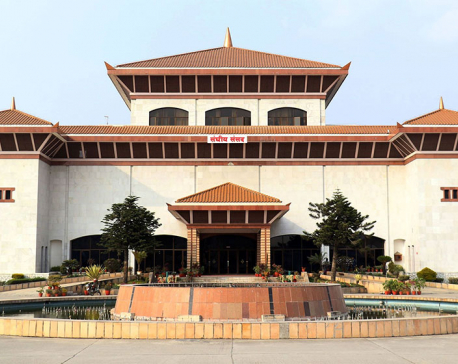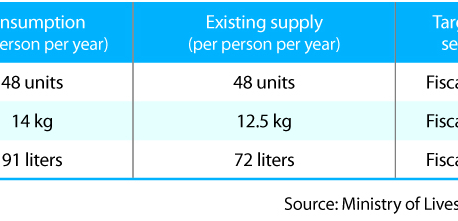
OR
Govt unveils plans to double agro production in five years
Published On: May 22, 2018 04:30 AM NPT By: Republica | @RepublicaNepal
KATHMANDU, May 22: The government has announced that it will take initiatives to modernize and commercialize agriculture with an ambitious target to double agricultural production in next five years.
The new policies and programs of the government have identified agriculture as one of the key sources for economic growth.
According to the policies and programs of the government, it would curb fragmentation and encroachment of arable land while also encouraging contract, cooperative and group farming.
The government also plans to pursue a policy to export high-value agro products and become self-reliant on major crops, cattle and fishery products.
Farmers will now get agro inputs like fertilizers, seeds and pesticides, farming equipment along with other necessary agro services from agriculture and cattle service centers of rural municipalities and municipalities, according to the policy and program document of the government for Fiscal Year 2018/19.
Similarly, the government would also set the minimum support price of paddy, wheat and sugarcane before cultivation of such crops. The new form of market intervention by the government is expected to protect agricultural producers from any sharp decline in farm prices. Furthermore, the government also vowed to regulate and regularly monitor the availability of agro inputs, production, storage and price of agro products.
For the risk management of farm products, the government has said that it would expand crop and cattle insurance program. The government has been providing subsidy to farmers to protect farmers from the losses of their crops and cattle.
The government has also made commitment to encourage investment in agro industries for increasing industrial production and make Nepal self-reliant.
Another regular commitment of providing irrigation in arable lands of hills and plain areas has featured in the policies and programs document of the current government. The government has said that it would develop small, mid and large scale irrigation projects by utilizing modern technology for provide irrigation facilities to arable land.
While lauding the government's commitment to prioritize agriculture sector in the policies and programs document, some experts say that the success of the government program largely depends on how the announcements are implemented.
“The announcement of doubling farm productions in the next five years is positive. However, there are other factors which determine the agricultural production,” said Bhola Man Singh Basnet, an agronomist. “Availability of agro inputs, irrigation facility and market access are some of the areas where there is the need of government intervention.”
He also said that the think-tank that the government plans to form should also include experts from agriculture who have a proven track record for development of agriculture sector.
The government has also said that it would run a campaign to increase organic agro production and make the country 'Organic Nepal'. However, some experts say that the government's plan of starting 'Organic Nepal' campaign contravenes the announcement to double agro production in five years.
“Of course, we can produce some organize products like tea and coffee which can be exported to European market,” said Basnet. “With the Organic Nepal campaign, it may not be possible for the country to double agro production in five years.”
You May Like This

Govt unveils plan to attract 2.5 million tourists in 5 years
KATHMANDU, Aug 2: The government has forwarded ambitious plan and programs with an objective of attracting 2.5 foreign tourists within... Read More...

Govt to propose budget on May 29 after parliament approves govt plans
KATHMANDU, May 27: The budget for current fiscal year 2018-2019 will be presented on May 29, Tuesday 4:00 PM. ... Read More...

Govt plans to make Nepal self-sufficient in milk, meat in 2 years
KATHMANDU, July 26: After achieving self-sufficiency in eggs in Fiscal Year 2016/17, the government is now ramping up efforts to become... Read More...




Just In
- Govt receives 1,658 proposals for startup loans; Minimum of 50 points required for eligibility
- Unified Socialist leader Sodari appointed Sudurpaschim CM
- One Nepali dies in UAE flood
- Madhesh Province CM Yadav expands cabinet
- 12-hour OPD service at Damauli Hospital from Thursday
- Lawmaker Dr Sharma provides Rs 2 million to children's hospital
- BFIs' lending to private sector increases by only 4.3 percent to Rs 5.087 trillion in first eight months of current FY
- NEPSE nosedives 19.56 points; daily turnover falls to Rs 2.09 billion















Leave A Comment